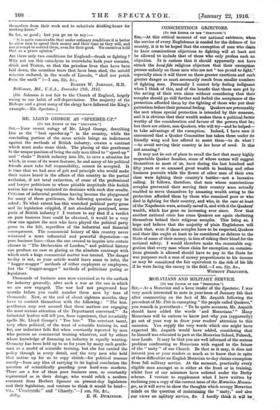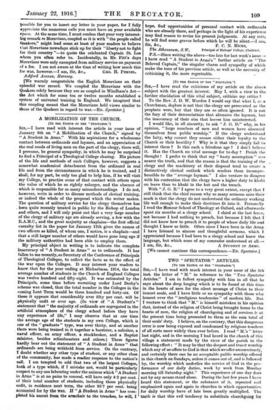MORAVIANS AND MILITARY SERVICE.
[TO THE EDITOR OF THE " SPEOTATOL") SIR,—As a Moravian and a keen reader of the Spectator, I was very much interested to note in your issue of January 8th that after commenting on the fact of Mr. Asquith following the precedent of Mr. Pitt in exempting " the people called Quakers," you remark in parenthesis : " To be quite accurate, Mr. Asquith should have added the words and Moravians.' " Many Moravians will be curious to know just why you (apparently) go out of your way to draw your readers' attention to this omission. You supply the very words which one might have expected Mr. Asquith would have added, considering that he himself was educated in part at the Moravian School, Fulneck, near Leeds. It may be that you are well informed of the serious problem confronting us Moravians with regard to the future of the " unity " of our Church. Be that as it may, it does not interest you or your readers so much as to know that in spite of these difficulties no English Moravian to-day claims exemption from full military service. At the moment, practically every eligible man amongst us is either at the front or in training, whilst four of our ministers have enlisted under the Derby scheme. I venture to supplement what I have written by enclosing you a copy of the current issue of the Moravian Armen- ger, as it will serve to show the thoughts which occupy Moravian minds on the question of maintaining the " unity," and also our views on military 'service, &e. I hardly think it will be . .
possible for you to insert my letter in your paper, for I fully appreciate the numerous calls you must have on your available space. At the same time, I must confess that your very interest- ing remark re Moravians, coupled as it is with "the people called Quakers," might lead some at least of your readers to believe t hat Moravian)] nowadays stick up for their "liberty not to fight for their country "—to quote the celebrated Captain St. Loa whom you often refer to Incidentally, in Mr. Pitt's days Moravians were only exempted from military service on payment of a fee. I am not aware at the time of writing how much this fee was, however.—I am, Sir, &c., Gno. H. PESISEL. Ashford Avenue, Hornsey.
[We warmly congratulate the English Moravians on their splendid war record. We coupled the Moravians with the Quakers solely because they are so coupled in Windham's Act— the Act which for some ten or twelve months established a system of universal training in England. We imagined that this coupling meant that the Moravians held views similar to those of the Quakers in regard to war.—ED. Spectator.]



































 Previous page
Previous page